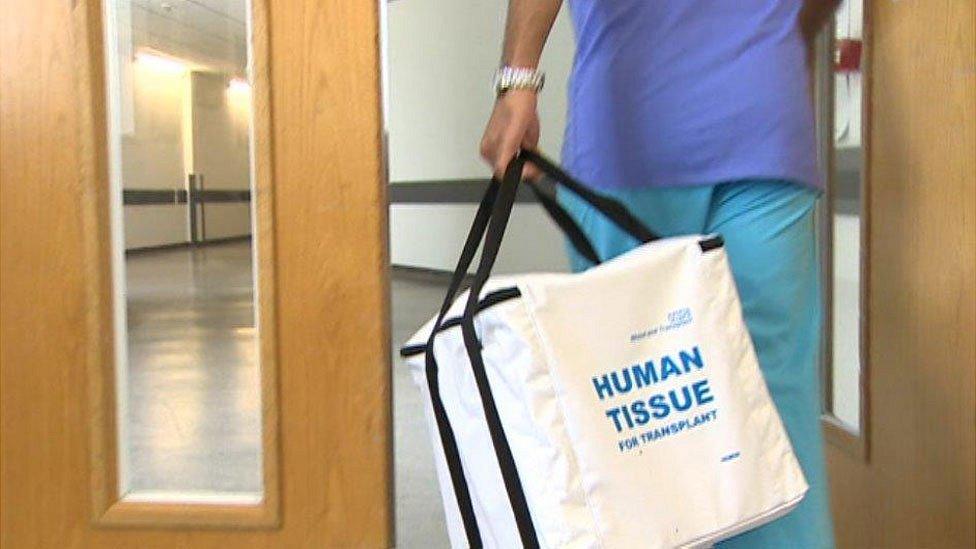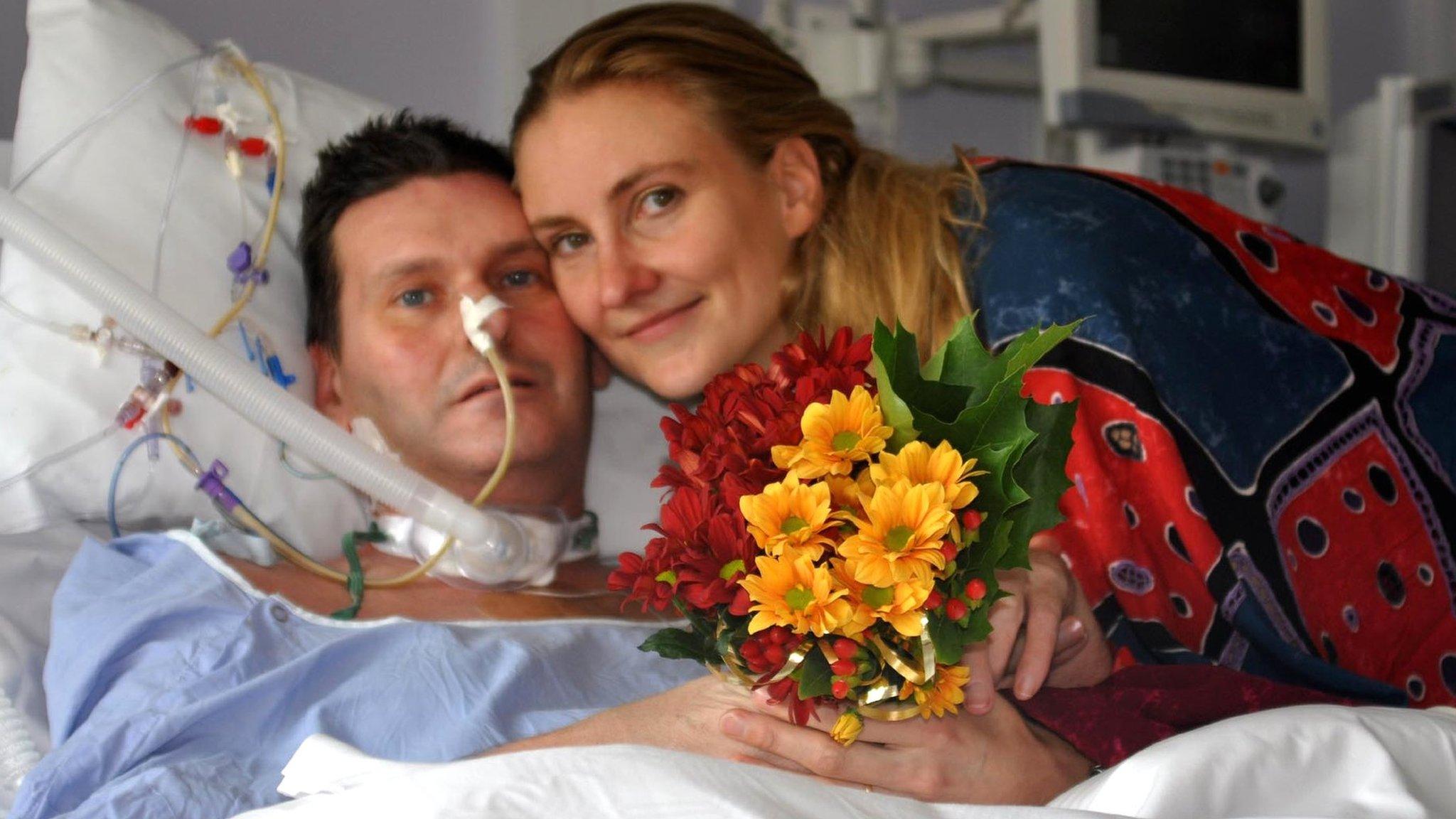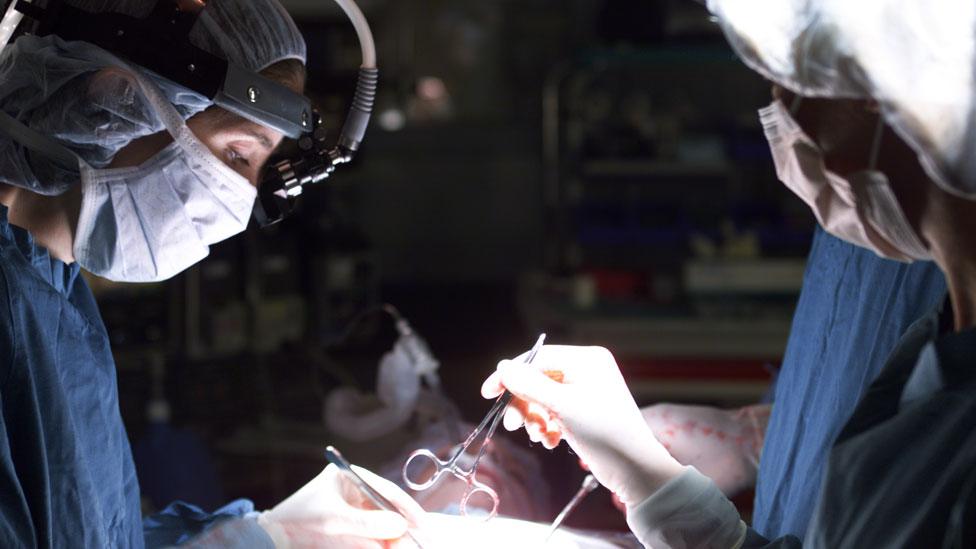Opt-out organ donation shift wins backing
- Published
"My only cure was a transplant"
A shift to an "opt-out" system for organ donation has been backed by MSPs on Holyrood's health committee.
They expressed support for the bill which would see a major change to the system in Scotland.
At present, people must "opt in" by registering to donate their organs for transplants after they die.
Under the bill before the Scottish Parliament, it will be assumed people were in favour of donation unless they have stated otherwise.
The Human Tissue (Authorisation) (Scotland) Bill will now be considered by the full parliament.
It follows similar legislation passed in Wales in 2015 and allows parts of an adult's body to be used in transplants in the absence of express permission.
However, it includes provisions to make sure the wishes of families and next of kin continue to be respected, and excludes children and adults who do not have the capacity to understand the rules.
The health committee heard evidence that donor numbers had increased since the current law was introduced in 2006, with more than half of Scotland's population registered to donate their organs or tissue after their death - the highest rate in Britain.
However, at any one time in Scotland there are more than 500 people waiting for a transplant, which could save or transform their lives.

Joanne's story

About 500 people in Scotland are waiting for an organ transplant
Joanne Adam needed six organs transplanted after a cancer diagnosis.
She had her transplant in September 2017 and said she does not know if she would be alive to celebrate her birthday on Saturday without the operation.
Ms Adam told BBC Scotland News that she cherished her life and the opportunity to see her grandchildren grow up - an opportunity she attributes to her organ donor and their family.
She said: "I can't thank my donor enough, and their family, for what they've done for me."
Before the transplant, she used to question whether "tomorrow was ever going to come" but thinks the transplanted organs have given her a new lease of life.
She added that donating an organ was a selfless thing to do.
"If you were willing to have an organ, you should be selfless enough to give an organ," she said.

No evidence
Dr Margaret McCartney is a GP working in Glasgow. She told the BBC's Good Morning Scotland programme that she fully supported organ donation but the question was what helped to increase donor rates.
She said: "There isn't any good evidence that would suggest that having this opt-out scheme actually increases the rates of donation.
"If you look at what's happening in Wales, there has been no clear rise in organ donation since the opt-out law was brought in to place in 2015."
She added that there had been a clear rise in Scotland since 2014/15 in organ donations without this legislation.
Dr McCartney said if you look at the research globally, the key to increasing donations seems to be having an infrastructure in place to support organ donation.
She highlighted the importance to things like resources and staff who can raise the topic of organ donation sensitively with bereaved families.
A "soft" opt-out, where families can object on behalf of the donor, also raises concerns for Dr McCartney.
She said it was appropriate not to go past family wishes, and said the law "could be seen to be a conflict between the medical profession and the family".
"That in itself can create many problems," she said.
"I don't think that's something we've thought long and hard enough about."
'Correct approach'

Lewis Macdonald said the committee supported the move
Committee convener Lewis Macdonald said he thought moving to the opt-out system was the "correct approach".
However, he said there needed to an "awareness-raising campaign" so people were familiar and comfortable with the change.
He said: "This will ensure everyone can have confidence in this new approach while engagement should be ongoing and include targeting harder-to-reach groups."
- Published19 December 2018

- Published1 August 2018

- Published11 June 2018

- Published1 December 2016
